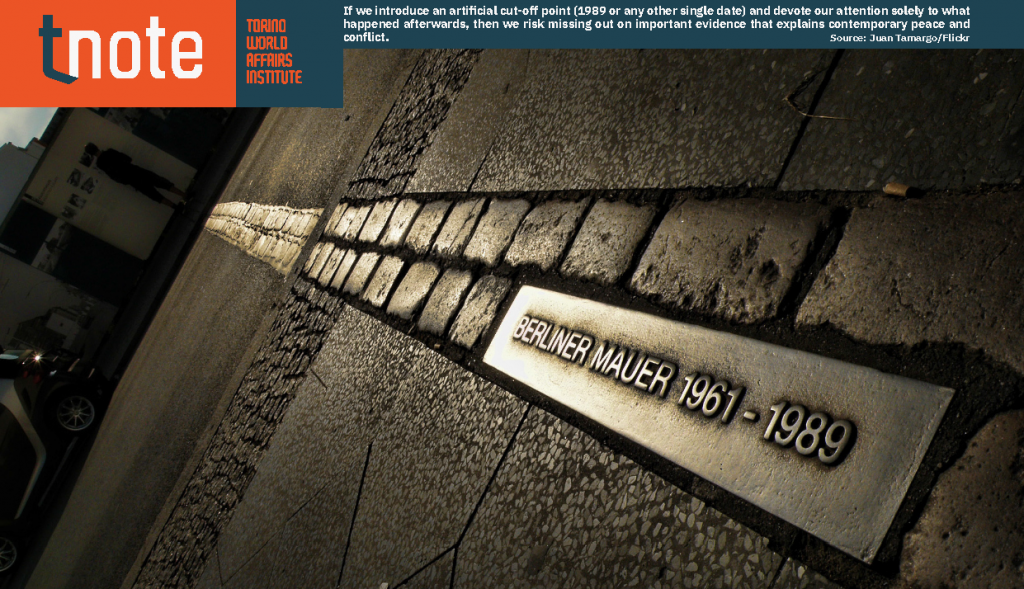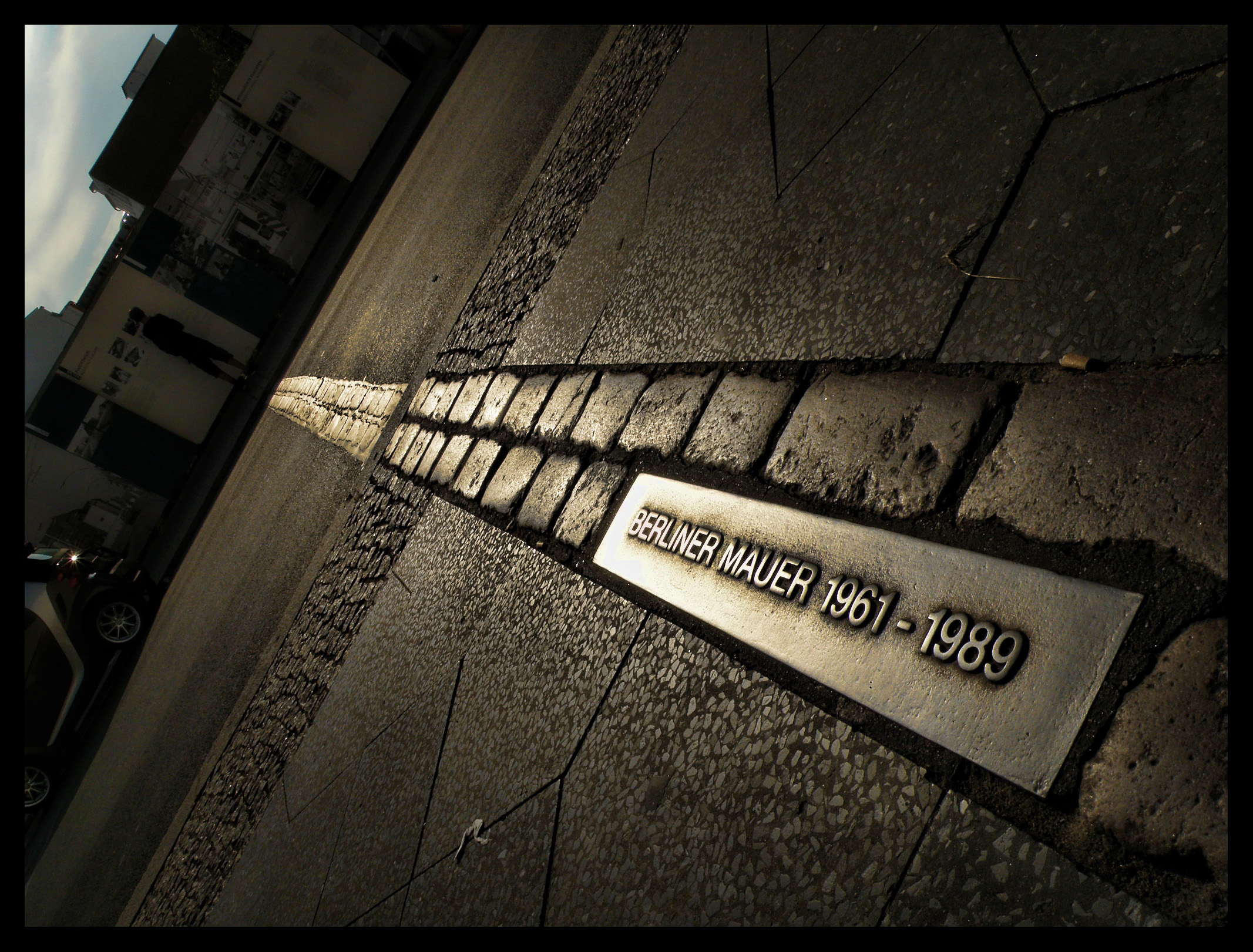
It is very common to read Peace and Conflict Studies books and articles that have a frame of reference that is exclusively post-1989. Many articles and book chapters begin with the words ‘After the Cold War’ or use the phrase ‘post-Cold War’. Certainly the end of the Cold War was a massive event. The Cold War was not just a geopolitical event, it was also a way of organising thinking. Many analysts saw the world through the lens of the Cold War: states and organisations were either pro-US or pro-Soviet. An entire category of terminology was developed during the Cold War: iron curtain, détente, hotline, superpower and so on. And then the Cold War ended in a way, and at a speed, that surprised virtually everyone. The usual ‘map’ of the world no longer applied, and analysts had to find new ways to describe peace, conflict and development.
This T.note seeks to make the case that we should ‘historicise’ Peace and Conflict Studies – that is, we should be aware of the longue durée or the longer term. Current events do not just happen. Instead, they are a product of multiple social, economic, political, cultural and environmental processes. To say that the world began in 1989, or that we should devote most of our attention to what happened after 1989, risks missing out on important evidence that explains contemporary peace and conflict.
The problem with taking an a-historical view, or of not paying enough attention to history, is that we do not fully understand the roots and evolution of a conflict, and therefore any peacebuilding intervention is likely to miss the real issues. It is understandable that policy-makers, practitioners, journalists and academics must react to current problems. Rohingya refugees in Bangladesh are probably not much interested in the long history of their peoples and the political economy of agriculture, land ownership and trade that has contributed to their predicament. They are faced with immediate problems that demand immediate solutions. Similarly, a practitioner working with a non-governmental organisation to help the refugees with shelter, sanitation or education probably does not need to know the long history. The data that the practitioner needs will come from a needs assessment, perhaps with data produced in real time and sent electronically to logisticians and others in the humanitarian sector.

If we introduce an artificial cut-off point (1989 or any other single date) and devote our attention solely to what happened afterwards, then we risk missing out on important evidence that explains contemporary peace and conflict. Source: Juan Tamargo/Flickr
Yet, it is worth separating immediate needs from structural processes and issues that might be embedded in institutions, cultures and economies. The immediate needs of the Rohingya might be met, but that does not address the long-standing issues of their exclusion from the dominant society in Myanmar. Without addressing those issues, and crucially understanding their historical context, it seems difficult to deal with issues of refugee return and preventing a repeat of the large-scale displacement. This requires a longer timeframe.
Moreover, and specifically relating to the academic world, it is simply bad scholarship to analyse societies and problems in a de-contextualised way. Academia relies on an objective (or as objective as is possible) review of evidence. But if one introduces an artificial cut-off point (1989 or any other single date) in terms of the evidence to be reviewed, then we risk not seeing the whole picture. Indeed, it is very noticeable that the social sciences, and Peace and Conflict Studies, suffer from a citation bias in that the vast majority of books and articles cited in academic work is recent – often published within five or six years. At face value, this might not be a problem in that academic work is iterative – each study is supposed to build upon previous studies to produce an evolving and constantly updating set of analyses. But if we look at the content of many books and articles on contemporary peace and conflict, we see that the historical coverage is often very scant. After a paragraph or two on what went before the current crisis, many articles (and some books) concentrate on the current era or event. The risk is that analyses are shallow, do not fully understand the context of problems, and so recommend ‘solutions’ that might address symptoms rather than causes.
The obvious remedy is to recommend that we take greater care to contextualise our studies and take account of the long historical processes that result in present-day crises. But we cannot all become historians and history itself offers few guarantees of total vision. After all, history is often biased and contested. So what can we do?
First, we can move away from linear notions of time in which there is a straightforward timeline that progresses from one year to another. This straightforward model of time is useful in simplifying complex situations, but it is not always accurate. Imposing an overly simplistic imaginary of time on a situation is another form of colonialism or bias. People may wish to view time in different ways. Not all time moves at the same pace.
Second, it is useful to differentiate between events and processes. The immediacy of events can demand our attention. But events are the result of processes. Thus, a timeline that merely reports events (such as the election of a new president, a ceasefire, a peace accord) and does not record the trends in the society, polity or economy risks missing the wider picture.
Third, and as already alluded to, it seems sensible to understand that there are multiple timescapes. While some actors might measure time in terms of years, or elections, or other events in the formal political calendar, this might not equate to how people on-the-ground measure time. For them, more sociological or personal or familial timescapes might seem more obvious. For them, 1989 might not be the year that the Berlin Wall fell. Instead, it was the year that their daughter was born or their grandfather died.
These prompts all involve thinking differently about time and invite us to reflect on how we deal with it in Peace and Conflict Studies. For understandable reasons, we often focus on immediate problems. But we risk overlooking important parts of the evidential trail if we do not try to understand the long-term processes that account for present-day circumstances.
Author
Roger Mac Ginty is Professor in Defence, Development and Diplomacy in the School of Government and International Affairs at Durham University
Download


Copyright © 2025. Torino World Affairs Institute All rights reserved
